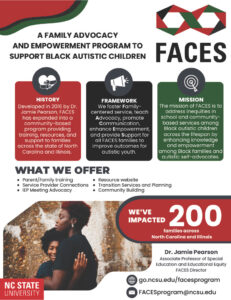 The Autism Society of North Carolina is partnering with FACES for Autism to offer 5-week training courses designed to improve knowledge, advocacy, and empowerment among underrepresented parents of children with autism.
The Autism Society of North Carolina is partnering with FACES for Autism to offer 5-week training courses designed to improve knowledge, advocacy, and empowerment among underrepresented parents of children with autism.
The FACES Framework is family-centered care with a focus on Fostering Advocacy, Communication, Empowerment, and Support to improve your child’s outcomes and your family’s quality of life. Strong communication skills within your family enable you to effectively express your concerns and desires, this enhances your ability to advocate for your child and promote the long-term well-being of your family.
FACES is an acronym which means that this program Fosters family-centered services by listening to the needs and desires of the families we serve. They teach Advocacy and the importance of speaking up for autistic loved ones, being a voice for family, and discussing the family’s wishes with the appropriate parties. They promote Communication between families and support professionals. They seek to enhance Empowerment by informing families of their rights and helping them feel confident in their knowledge and abilities to seek appropriate services. They provide Support for all FACES families to improve outcomes for autistic youth. They put thoughts into words, and words into actions that remove the barriers underserved families face while navigating services for autistic loved ones.
Who is eligible?
Participants must be Black caregivers of Black autistic children ages 3-18. Participants must be 18 years of age or older to take part. All participant information will remain confidential. Participants will receive a $100 stipend for completing the five FACES sessions. Each group will have 9-10 families.
What is offered?
Participants will receive training and resources on special education laws and procedures, strategies for managing behavior, strategies to support effective communication, and coaching on how to increase autism knowledge and awareness among family and community members. Because these training courses are based in the community, participants can build relationships with other parents and children who have shared experiences.
When is it offered?
Spring 2024, exact dates to be determined
Where is it offered?
Charlotte Metropolitan, Piedmont, Sandhills, Triad, and Triangle, areas. These sessions are not available virtually and will require in-person participation.
Families from any of these regions are encouraged to attend.
How do I sign up?
Families can self-refer! No need for an outside referral. See the flyer for information and who to contact.
Why is it important?
The rising number of Black individuals being diagnosed with Autism at a younger age is a positive development, likely due to improved access to healthcare in recent years. These findings suggest there has been amazing progress in raising awareness about Autism, identifying the condition, providing services in underserved communities, and improving access to these services.
Despite this progress, there is still much work to be done for the Black Autistic community. For instance, Black children with Autism are more often identified as having intellectual disabilities compared to Hispanic and White children, indicating that they are flagged more frequently for concerns about their learning abilities and daily functioning.
The CDC is concerned about this data and their concerns are valid because the percentage of intellectual disabilities among Black children compared to other races is disproportionately higher. While the recent percentage of autism diagnoses among Black children is slightly higher than that among White children, disparities and racial discrimination continue to affect how Black children are identified. The data proves it.
This is why FACES is so important and why ASNC has partnered with FACES to support Black communities with the disparities they face.
FACES is funded by the Institute of Education Sciences via a grant awarded to North Carolina State University, led by Principal Investigator (PI) DR. Jamie Pearson, PhD. To learn more, visit FACES for Autism project.
Are you looking for early intervention services for Black autistic children across North Carolina? Read about BFAST here!
Go back
